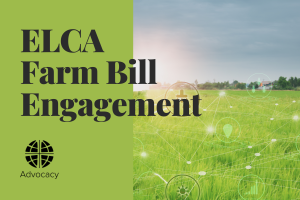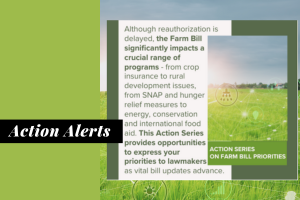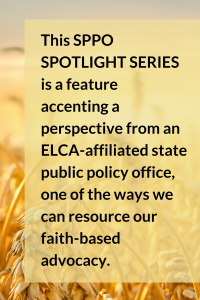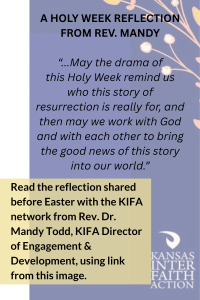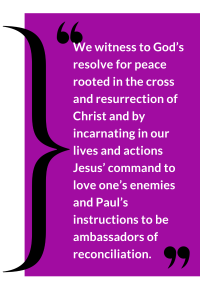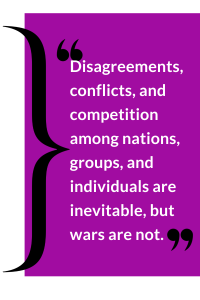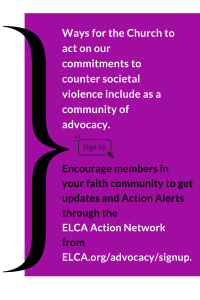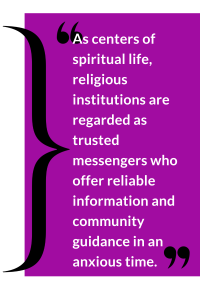from the ELCA advocacy office in Washington, D.C. – the Rev. Amy E. Reumann, Senior Director
DOMESTIC SERVICES AND GRANT ACCESS | PRESIDENT TRUMP WITHDRAWS FROM THE PARIS AGREEMENT | FOREIGN ASSISTANCE PROGRAMS | USAID IMPACTS | IMMIGRATION IMPERATIVES
This month has seen rapidly developing impact of executive actions from President Trump, jolting a vast array of government agencies and the people who intersect with related vital supports. All Witness in Society staff have been active with ELCA colleagues and partners to discern and advocate in the rapidly evolving, complex political climate, and with voicing ELCA priorities through shared experiences and ELCA social teachings with policy makers.
The ELCA presiding bishop has brought important reflection and action on current events, including through videos. Find “Responses to Executive Orders on Immigration” (2/14/25), “ELCA Responds to False Accusations on X” (2/2/25) and “Faith, fear and the call to community” (2/21/25) from the playlist on the ELCA Advocacy YouTube Channel as well as ELCA socials.
 DOMESTIC SERVICES AND GRANT ACCESS: Confusion follows an executive order implemented by the Office of Management and Budget (OMB) of a federal funding freeze on all federal aid and grants to organizations – largely impacting states and nonprofits. Though the memo has since been rescinded, aftershock impacts continue. The aftershock impacts left many domestic program funding portals, such as Medicaid for states and Section 8 assistance, inaccessible. Access to grants was closed for several days – with some programs still inaccessible for a lingering period, and with a federal judge citing evidence that the administration is continuing to freeze programs despite a court order.
DOMESTIC SERVICES AND GRANT ACCESS: Confusion follows an executive order implemented by the Office of Management and Budget (OMB) of a federal funding freeze on all federal aid and grants to organizations – largely impacting states and nonprofits. Though the memo has since been rescinded, aftershock impacts continue. The aftershock impacts left many domestic program funding portals, such as Medicaid for states and Section 8 assistance, inaccessible. Access to grants was closed for several days – with some programs still inaccessible for a lingering period, and with a federal judge citing evidence that the administration is continuing to freeze programs despite a court order.
Why It Matters in the ELCA
Regular administration of basic domestic services and grants is a core necessity for many low-income programs. The tangible result of this freeze included pausing research for cures for cancer, halting food assistance, stopping infrastructure construction, closing suicide hotlines, and much more. Delays in payments also resulted in furloughing programmatic staff while creating mass confusion among shelters, food pantries and contractors. Though the federal freeze for domestic aid programs has since been rescinded, Department of Government Efficiency (DOGE) staff have indicated they will continue combing all programs that help low-income families for consideration of elimination.
What’s Next
Several non-profit organizations and states, including the National Council of Nonprofits, are leading lawsuits against this U.S.-wide grant freeze which resulted in the initial withdrawal of the memo. ELCA Witness in Society staff will be tracking the progress of the lawsuit alongside Lutheran partners, while sharing with lawmakers the impact of the short-term freeze.
 PRESIDENT TRUMP WITHDRAWS FROM THE PARIS AGREEMENT: Upon being inaugurated into the office of the U.S. president, Donald Trump immediately issued an EO calling for the United States to withdrawal from the Paris Agreement. This action will take the United States out of the first global agreement to collectively combat climate change.
PRESIDENT TRUMP WITHDRAWS FROM THE PARIS AGREEMENT: Upon being inaugurated into the office of the U.S. president, Donald Trump immediately issued an EO calling for the United States to withdrawal from the Paris Agreement. This action will take the United States out of the first global agreement to collectively combat climate change.
Why It Matters in the ELCA
The ELCA stands strong in its commitment to caring for creation, and in that commitment, bolstered by the 2023 social message “Earth’s Climate Crisis,” calls for government action toward combatting climate change and promoting a clean energy transition. The ELCA has been present and advocating for positive action at the annual Conference of Parties to the Paris Agreement and the United Nations Framework Convention on Climate Change (COP). The experience of our Lutheran delegation at the recent COP29 was shared in a webinar. A recording of this webinar, “Voices of Faith in Climate Action: COP29 and Beyond,” is available.
What’s Next
As one of the largest global emitters of greenhouse gases, the withdrawal of the United States from the Paris Agreement gravely threatens global progress on climate change as well as multilateral cooperation more generally. ELCA advocacy staff will continue to advocate for policies and regulations in line with the Nationally Declared Contribution (NDC), country commitments to reduce national emissions and adapt to the impacts of climate change within the Paris Agreement, which were announced by the outgoing Biden administration.
 FOREIGN ASSISTANCE PROGRAMS: Most U.S. foreign assistance programs have been impacted by a series of EOs and directives that were issued by President Trump soon after his inauguration. The administration has sent stop-order requirements to all existing foreign assistance awards, effectively pausing implementation of many development and humanitarian programs in low and middle-income countries. This is in addition to the EO pausing new U.S. foreign assistance obligations and disbursements pending a 90-day review. The President’s Emergency Plan for AIDS (PEPFAR) is one of the programs that have been impacted.
FOREIGN ASSISTANCE PROGRAMS: Most U.S. foreign assistance programs have been impacted by a series of EOs and directives that were issued by President Trump soon after his inauguration. The administration has sent stop-order requirements to all existing foreign assistance awards, effectively pausing implementation of many development and humanitarian programs in low and middle-income countries. This is in addition to the EO pausing new U.S. foreign assistance obligations and disbursements pending a 90-day review. The President’s Emergency Plan for AIDS (PEPFAR) is one of the programs that have been impacted.
Why It Matters in the ELCA
The ELCA has long been involved in advocacy related to U.S. foreign aid to help fight hunger, extreme poverty and disease around the world. Millions of lives have been saved because of U.S. foreign aid programs such as PEPFAR, which by itself has saved over 25 million lives.
What’s Next
While Secretary of State Marco Rubio has now issued an emergency humanitarian waiver to allow portions of PEPFAR programs to continue, the waiver is temporary and limited in scope. It does not cover new or future work unless a separate waiver is granted and does not apply to other global health efforts such as cervical cancer screenings. Witness in Society staff are working with advocacy partners to push back against suspension of U.S. foreign assistance.
 USAID IMPACTS: Currently, the attempted dissolution of the U.S. Agency for International Development (USAID), the government agency overseeing global efforts to improve health and education and decrease poverty and hunger, is having a large impact on global assistance around the world, with broad impacts including to Augusta Victoria Hospital (AVH). This includes the inability for humanitarian aid to arrive to intended communities, and grants, contracts and payments already owed to organizations going unpaid or being cancelled. Such payments included funds set to be paid to the AVH, which is run by Lutheran World Federation. The actions impacting USAID started with a stop-work order, halting nearly all USAID programs pending a 90-day review, followed by layoffs and a shutdown of the USAID website, along with an order impacting workers.
USAID IMPACTS: Currently, the attempted dissolution of the U.S. Agency for International Development (USAID), the government agency overseeing global efforts to improve health and education and decrease poverty and hunger, is having a large impact on global assistance around the world, with broad impacts including to Augusta Victoria Hospital (AVH). This includes the inability for humanitarian aid to arrive to intended communities, and grants, contracts and payments already owed to organizations going unpaid or being cancelled. Such payments included funds set to be paid to the AVH, which is run by Lutheran World Federation. The actions impacting USAID started with a stop-work order, halting nearly all USAID programs pending a 90-day review, followed by layoffs and a shutdown of the USAID website, along with an order impacting workers.
Why It Matters in the ELCA
As of this writing, $10 million in payments that were already obligated and set to be paid out in January 2025 to AVH are in limbo. USAID’s payment system is still not working and the process for obtaining a humanitarian waiver is unclear and disorganized. There is no clarity whether this money will ever arrive at the hospital, despite this money being allocated by last year’s 118th Congress to the hospital.
What’s Next
Witness in Society and LWF staff members worked together to submit a humanitarian waiver to the U.S. Department of State in support of unfreezing the $10 million obligation and are working to follow up on that request. Additionally, ELCA advocacy staff will be supporting advocacy efforts by LWF in Washington, D.C. at the end of February in support of future funds for the AVH and the wider East Jerusalem Hospital Network.
 IMMIGRATION IMPERATIVES: Well over ten of the Trump administration EOs are directly related to revoking the previous administration’s immigration imperatives or setting new policies and directives. Immediate impacts included from the EO “Protecting the American People Against Invasion,” which expands expedited removal nationwide. Expedited removal is a fast-tracked deportation process without, generally, a chance to go before a judge. It mainly applies to more recent newcomers suspected of being undocumented. In recent days, the Department of Homeland Security (DHS) has also revoked the protected areas memo, which restricted U.S. Immigration and Customs Enforcement (ICE) activity in places like churches, hospitals and schools. Additionally, EOs have threatened various temporary protection programs. Affected parole programs include those for Ukrainians, Cubans, Haitians, Nicaraguans and Venezuelans, and Central American minors. An extension for Temporary Protected Status (TPS) for Venezuelans was also revoked.
IMMIGRATION IMPERATIVES: Well over ten of the Trump administration EOs are directly related to revoking the previous administration’s immigration imperatives or setting new policies and directives. Immediate impacts included from the EO “Protecting the American People Against Invasion,” which expands expedited removal nationwide. Expedited removal is a fast-tracked deportation process without, generally, a chance to go before a judge. It mainly applies to more recent newcomers suspected of being undocumented. In recent days, the Department of Homeland Security (DHS) has also revoked the protected areas memo, which restricted U.S. Immigration and Customs Enforcement (ICE) activity in places like churches, hospitals and schools. Additionally, EOs have threatened various temporary protection programs. Affected parole programs include those for Ukrainians, Cubans, Haitians, Nicaraguans and Venezuelans, and Central American minors. An extension for Temporary Protected Status (TPS) for Venezuelans was also revoked.
Why It Matters in the ELCA
The combined EOs represent an unprecedented expansion of immigration enforcement—beyond what has been attempted before or may even be reasonable and feasible. The ELCA social policy resolution, “Towards Compassionate, Just, and Wise Immigration Reform,” specifies that, “This church advocates for a fair deportation process consistent with American values, for example, the right to appointed legal representation and a hearing before a judge.” Family unity and due process for immigrants remain a concern amid the flurry of actions. As the policies roll out: Lutheran congregations have been forced to cancel worship celebrations as community members express fear; congregations have navigated how to share Know Your Rights information with community members; and Lutheran members and congregations who sponsored refugees, Ukrainians and Venezuelans under the temporary parole programs have expressed concern about the future for those they welcomed.
What’s Next
Before and after the EOs, numerous briefings have taken place with ELCA communities and networks to help others understand the lay of the land and share resources. The ELCA program director for migration policy has shared updates in multiple networks. The ELCA Action Alert on the foreign aid funding freeze also addressed the extremely concerning pause on resettlement aid for recently arrived refugees. ELCA advocacy has also been active on the Hill. The ELCA program director, Latino Ministry, and program director, migration policy, recently met with Republican and Democratic offices to discuss the impact of the EOs and encourage common-sense solutions for the community.
Receive monthly Advocacy Connections directly by becoming part of the ELCA Advocacy network – http://elca.org/advocacy/signup , and learn more from elca.org/advocacy .


